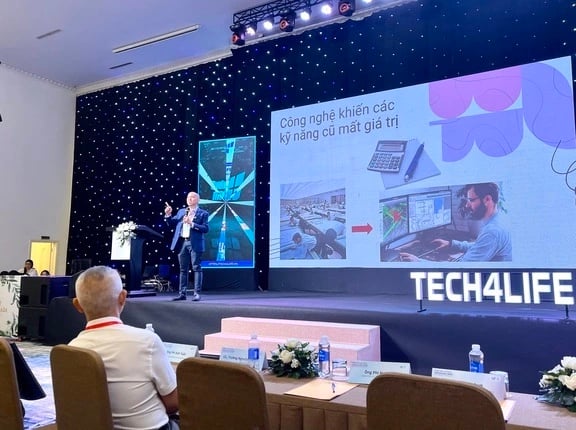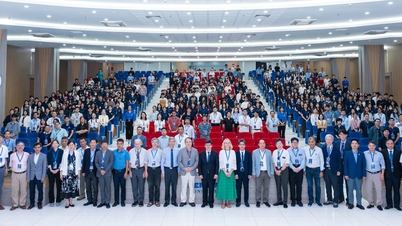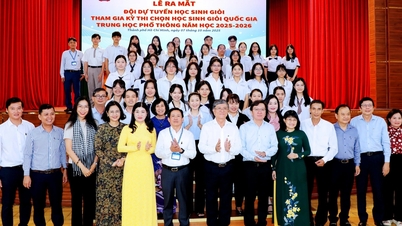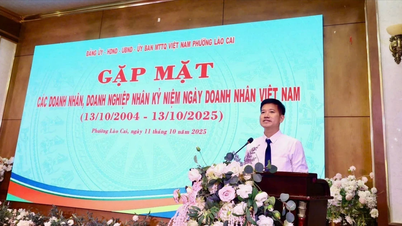Distraction of attention - the disease of the age
The talk began. The speaker stepped onto the stage, the lights were bright, but below, the brightest thing was still hundreds of phones. Some were surfing social media, some were recording "check-in", some were just sitting there for the roll call time. When the sharing session ended, many people left immediately, not remembering the name of the speaker. The hall was full of people, but the knowledge was left hanging, untouched.

The speaker stepped onto the stage, the lights were bright, but below, the brightest things were still hundreds of cell phones.
Photo: TN created by Gemini
This scene is no longer strange in the university environment. Today's generation of students are living in a sea of information, with their phones as an inseparable object. The phone has become a "window to the world ", but also an invisible wall that makes young people gradually move away from the reality before their eyes.
According to the Exploding Topics 2025 survey, the average person checks their phone about 58 times a day . According to the Digital 2024: Vietnam report by DataReportal (We Are Social), the average Vietnamese user spends about 6 hours and 18 minutes a day connecting to the internet, of which 2 hours and 2.5 minutes are spent on social networks , and nearly 95.8% access via smartphone . Each touch of the screen is an interruption. They no longer pay deep attention to anything for long enough; concentration is broken into hundreds of fragments throughout the day.
The “multitasking” mentality makes many students believe that they can listen to a speaker and update their personal information at the same time. But in fact, psychological research shows that when the brain has to divide its attention between multiple tasks: listening, surfing the internet, texting, the effectiveness of each task is greatly reduced. In this way, the listener becomes a passive observer, not really absorbing the content.
In addition, the expectation of a “talk” is sometimes not what it used to be. If the content is not new, not related to the reality of their career or personal life, students easily feel that it is “normal”, like something they have heard many times. When they are fans of speed, they want short, breakthrough content, not long talks with theoretical sections. Over time, this behavior becomes a habit: putting the phone in front of them when entering the room, preparing a “secondary screen”, but not preparing to listen. When the talk begins, they have activated an invisible barrier, the screen, forcing the speaker to approach with tone, look and interaction, not just through the slide.

Many universities invest in organizing talks, career seminars, and inviting prestigious speakers with the hope of inspiring students to learn.
Photo: My Quyen
Indifference is not because of indifference, but because of being used to quick stimulation.
Young people today are not lazy to study, they are just living in a world programmed to make it difficult for them to concentrate. Social networks, short videos , advertisements, games, all are designed to "keep the eyes" and "addict" with fast, strong, continuous stimulation. Their brains are used to the feeling of instant gratification. A video longer than 60 seconds is considered slow. A speech that takes 5 minutes to get to the main point is considered boring. When the outside world operates at high speed, sitting and listening to someone speak with a slow rhythm, long arguments, easily makes them feel lacking in energy. Instead of waiting, they open their phones, where thousands of contents are inviting. Indifference, therefore, does not come from apathy, but from overstimulation.
They don’t hate knowledge, it’s just that knowledge is no longer attractive enough in a world with too many options. But true knowledge is never something that can be consumed quickly. It requires time to absorb, silence to understand, and humility to receive. The worrying thing is that if this habit continues, they will not only lose the ability to learn deeply but also lose the ability to perceive - a core quality of a learner. When they cannot listen to others, they gradually forget how to listen to themselves.
Relearning to be present and listen
We can’t ask young people to go back to the days of “no phones.” But we can remind them that technology is no substitute for presence. A conversation is only truly valuable when the listener stops, looks up, and listens with curiosity, respect, and openness. Listening seems simple, but it is one of the most important skills of learning. A good listener not only receives information, but also has the ability to ask questions, connect, criticize, and grow.

Young people live in a world that is programmed to make it difficult for them to concentrate. Social media, short videos, ads, games, all are designed to "keep the eye" and "addict" with fast, strong, continuous stimulation.
Photo: TN creates open Gemini
Yet in many classrooms today, listening is disappearing. Not because students don’t respect speakers, but because their brains have become accustomed to instant stimulation. When nothing new happens for a few seconds, attention shifts away from the present. Little do they know that this lack of focus not only causes them to miss the lesson, but also gradually reduces their capacity to perceive. Without listening, they cannot understand deeply; without understanding deeply, they cannot create. And when this happens often enough, they lose an important adult capacity: the ability to focus and understand.
Smartphones help students connect with the world, but also distance them from the person speaking right in front of them. Every time they look away from the screen, they will see another world, a world of communication, of stories, of life experiences told with real emotions. The school, the lecturer or the speaker can do their part well, organize, share, inspire. But knowledge is only given when the listener truly receives. And receiving here is not by taking attendance, but by the complete presence of the mind.
When students look up from their screens, when they listen with their eyes and their ears, even a simple conversation can become a powerful lesson. We don’t need more seminars, we need more listeners – people who want to understand, learn, and change.
Source: https://thanhnien.vn/vi-sao-sinh-vien-tho-o-voi-nhung-buoi-noi-chuyen-bo-ich-18525101312000821.htm







![[Photo] Solemn opening of the 1st Government Party Congress](https://vphoto.vietnam.vn/thumb/1200x675/vietnam/resource/IMAGE/2025/10/13/1760337945186_ndo_br_img-0787-jpg.webp)
































![[Photo] General Secretary To Lam attends the opening of the 1st Government Party Congress](https://vphoto.vietnam.vn/thumb/1200x675/vietnam/resource/IMAGE/2025/10/13/1760321055249_ndo_br_cover-9284-jpg.webp)





































































Comment (0)